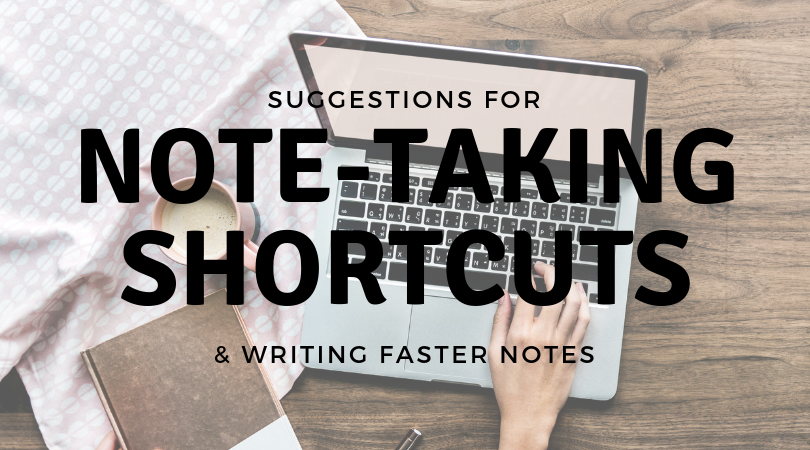Abbreviations for Faster Note-taking in Medical School
General and Medical Abbreviation Suggestions and Inspiration The use of proper abbreviations can really speed up your…

General and Medical Abbreviation Suggestions and Inspiration
The use of proper abbreviations can really speed up your note-taking process, but besides the ones you’ve grown up using, how do you discover new ones? I decided to compile a list of the ones I use, and hope you find some useful ones for yourself. These are meant to be INSPIRATION for you to develop your own system for faster note-taking: this is not a “formula” that you have to follow by any means!
Here is a list of abbreviations I always use when handwriting (and sometimes even when typing). I’ll make two lists: a general English one and medical English one. Comment your own abbreviations below and I’ll add them to the list and hopefully we can help others improve their note-taking skills.
General Abbreviations:
- a/w – associated with
- b/c – because
- b/w – between
- du2 – due to
- b/o – based on (“lab values are b/o human subjects”)
- i.e. – for example
- c/f – compared to (“arterial BP when c/f venous is much higher”)
- fx – effects (sound it out)
- m.u.o. (or muo) – ‘made up of’ and I use it for anything that is a constituent; i.e. “the scalp is muo 5 layers”
- w/ – with
- some people use C̅ to signify with
- w/o – without
- w/in – within
- v. or vv. – very (extremely)
- VIP – very important (usually followed by !!)
- Δ – change (“Δ in temp. indicates ___”)
- up/down arrows – increase, decrease (two arrows: large increase/decrease)
- + and – : positive and negative
Also, I tend to remove the end of the word and add a period to signify that it’s shortened, thus: evaluation becomes eval., component becomes comp., temperature is temp., and so on.
Some people remove all the vowels, for example: management becomes mgmnt.
Medical Abbreviations:
These are merely SUGGESTIONS and INSPIRATION for you to make your own — you absolute do not have to use these, nor will you want to. They are catered to me and my mind. As you’ll be able to see, I love using the letter ‘x,’ which is also very commonly including in medical abbreviations.
| nl anl | normal abnormal (new to me, love this one!) |
| hx h/o | history (like ‘pt hx’ means ‘patient history’) history of |
| dx Ddx | diagnosis, diagnostics differential diagnosis |
| tx | treatment, therapy, therapeutic |
| CTx | chemotherapy |
| sx asx | symptoms, symptomatic asymptomatic |
| c/o | complains of |
| mx (or mets) | metastasis/es, metastatic |
| Rx | drugs |
| Abx | antibiotics (diff than Ab, which is antibody) |
| prx | prognosis |
| sx | surgery (context is needed to differentiate from symptoms) |
| trx HTx LTx | transplant heart transplant lung transplant |
| indix CI | indication(s) contraindication(s) |
| DM1/DM2 | Type 1-2 diabetes mellitus* |
| cxc | cancer |
| plx | platelet(s) |
| VC VD | vasoconstriction vasodilation |
| CBC | complete blood count |
| SMC or VSM CT | smooth muscle (cells) or vascular smooth muscle connective tissue |
| c. or ₵ | cell |
| MPHs | macrophages |
| HTN hypoTN | hypertension hypotension |
| Failures: ARF heart failure liver failure | acute renal failure HF (congestive heart failure, CHF) hepF |
| N/V/D | nausea, vomiting, diarrhea |
| y.o. yr. | year old (59 yo m. pt) year (6 yr. h/o breast cxc) |
| pt | patient |
| ♀and ♂ | female and male, I always confuse the two (think of it like ♂represents a shield and spear) |
| SE | side effects |
| GN | glomerulonephritis (that’s a mouthful) |
| NT | neurotransmitter |
| AP syn. | action potential synapse |
| SY & PSY | sympathetic & parasympathetic |
| HS rxn | hypersensitivity reaction |
| AG ATG inhibs. | agonist antagonist inhibitors |
| BBB | blood brain barrier |
| Ag Ab | antigen antibody |
| vaxx | vaccine |
| sfc | surface (sfc R = surface receptors) |
| GIB | gastrointestinal bleeding |
My Absolute Favorite Technique
-xn for -ction ending
this one needs a little imagination and tweaking but its saved me SO much time (and wrist pain)
Examples of my FAVORITE shorthand:
reaction = rxn
function = funxn
infection = infxn
conduction = conduxn
*DM1/2: I know most people use T1DM or IDDM, but I started using these and it just stuck. And it’s faster for me.
Those are my suggestions for speeding up your already fast note-taking skills; I hope you’ve found new suggestions and ideas and if you’d like to develop other skills for note-taking, check out my other articles:
Also, take a look at my study and medical school resources:
Please feel free to suggest your own and let me expand my dictionary!



